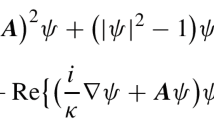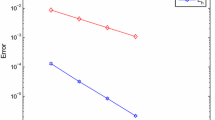Abstract
We propose and analyze residual-based a posteriori error estimator for a new finite element method for the time-dependent Ginzburg–Landau equations with the temporal gauge of superconductivity. The magnetic potential variable is approximated by \(H(\nabla \times ;\Omega )\)-conforming element and the scalar order parameter is approximated by the \(H^1(\Omega )\)-conforming element. Using the dual problem of a linearization of the original problem, we prove the reliability of the a posteriori error estimator, and an adaptive algorithm with the temporal and spatial refining and coarsening steps is then proposed. Numerical results are presented for illustrating the a posteriori error estimator and the adaptive algorithm in convex and nonconvex domains.






















Similar content being viewed by others
Data Availability
The datasets generated during and/or analysed during the current study are available from the corresponding author on reasonable request.
References
Tinkham, M.: Introduction to Superconductivity, 2nd edn. McGraw-Hill, New York (1996)
Li, M., Gu, J., Du, L., et al.: Time-dependent Ginzburg–Landau equations for multi-gap superconductors. Chin. Phys. B 29, 037401 (2020)
Blair, A.I., Hampshire, D.P.: Time-dependent Ginzburg–Landau simulations of the critical current in superconducting films and junctions in magnetic fields. IEEE Trans. Appl. Supercond. 28, 1–5 (2018)
Fan, J., Zhou, Y.: A regularity criterion to the time-dependent Ginzburg–Landau model for superconductivity in Rn. J. Math. Anal. Appl. 483, 123653 (2020)
Lara, A., González-Ruano, C., Aliev, F.G.: Time-dependent Ginzburg–Landau simulations of superconducting vortices in three dimensions. Low Temp. Phys. 46, 316–324 (2020)
Oripov, B., Anlage, S.M.: Time-dependent Ginzburg–Landau treatment of RF magnetic vortices in superconductors: Vortex semiloops in a spatially nonuniform magnetic field. Phys. Rev. E 101, 033306 (2020)
Gonçalves, W.C., Sardella, E., Becerra, V.F., et al.: Numerical solution of the time dependent Ginzburg–Landau equations for mixed (d+s) wave superconductors. J. Math. Phys. 55, 041501 (2014)
Spirn, D.: Vortex dynamics of the full time-dependent Ginzburg–Landau equations. Commu. Pure Appl. Math. 55, 537–581 (2002)
Gunter, D.O., Kaper, H.G., Leaf, G.K.: Implicit integration of the time-dependent Ginzburg–Landau equations of superconductivity. SIAM J. Sci. Comput. 23, 1943–1958 (2002)
Jing, Z., Yong, H., Zhou, Y.: Thermal coupling effect on the vortex dynamics of superconducting thin films: time-dependent Ginzburg–Landau simulations. Supercond. Sci. Techn. 31, 055007 (2018)
Coskun, E., Kwong, M.K.: Simulating vortex motion in superconducting films with the time-dependent Ginzburg–Landau equations. Nonlinear 10, 579 (1997)
Chapman, S.J., Howison, S.D., Ockendon, J.R.: Macroscopic models for superconductivity. SIAM Rev. 34, 529–560 (1992)
Du, Q., Gunzburger, M.D., Peterson, J.S.: Analysis and approximation of the Ginzburg–Landau model of superconductivity. SIAM Rev. 34, 54–81 (1992)
Du, Q.: Global existence and uniqueness of solutions of the time-dependent Ginzburg–Landau model for superconductivity. Appl. Anal. 53, 1–17 (1994)
Nédélec, J.C.: Mixed finite elements in \(\Re ^3\). Numer. Math. 35, 315–341 (1980)
Bangerth, W., Rannacher, R.: Adaptive Finite Element Methods for Differential Equations. Springer Basel AG, Basel (2003)
Eriksson, K., Johnson, C.: Adaptive finite element methods for parabolic problems I: a linear model problem. SIAM J. Numer. Anal. 28, 43–77 (1991)
Eriksson, K., Johnson, C.: Adaptive finite element methods for parabolic problems IV: nonlinear problems. SIAM J. Numer. Anal. 32, 1729–1749 (1995)
John, V., Linke, A., Merdon, C., Neilan, M., Rebholz, L.G.: On the divergence constraint in mixed finite element methods for incompressible flows. SIAM Rev. 59, 492–544 (2017)
Leis, R.: Zur Theorie elektromagnetischer Schwingungen in anisotropen inhomogenen Medien. Math. Z. 106, 213–224 (1968)
Duan, H.Y., Jia, F., Lin, P., Tan, R.C.E.: The local \(L^2\) projected \(C^0\) finite element method for Maxwell problem. SIAM J. Numer. Anal. 47, 1274–1303 (2009)
Duan, H.Y., Lin, P., Saikrishnan, P., Tan, R.C.E.: A least squares finite element method for the magnetostatic problem in a multiply-connected Lipschitz domain. SIAM J. Numer. Anal. 45, 2537–2563 (2007)
Costabel, M., Dauge, M.: Singularities of electromagnetic fields in polyhedral domains. Arch. Rational Mech. Anal. 151, 221–276 (2000)
Girault, V., Raviart, P.-A.: Finite Element Methods for Navier–Stokes Equations. Springer, Berlin (1986)
Gao, H., Li, B., Sun, W.: Optimal error estimates of linearized Crank–Nicolson Galerkin FEMs for the time-dependent Ginzburg–Landau equations in superconductivity. SIAM J. Numer. Anal. 52, 1183–1202 (2014)
Duan, H.Y., Lin, P., Tan, R.C.E.: \(C^0\) elements for generalized indefinite Maxwell’s equations. Numer. Math. 122, 61–99 (2012)
Duan, H.Y., Tan, R.C.E., Yang, S.-Y., You, C.-S.: Computation of Maxwell singular solution by nodal-continuous elements. J. Comput. Phys. 268, 63–83 (2014)
Duan, H.Y., Lin, P., Tan, R.C.E.: Analysis of a continuous finite element method for H(curl, div)-elliptic interface problem. Numer. Math. 123, 671–707 (2013)
Duan, H.Y., Lin, P., Tan, R.C.E.: A finite element method for a Curlcurl-Graddiv eigenvalue interface problem. SIAM J. Numer. Anal. 54, 1193–1228 (2016)
Gao, H., Sun, W.: An efficient fully linearized semi-implicit Galerkin-mixed FEM for the dynamical Ginzburg–Landau equations of superconductivity. J. Comput. Phys. 294, 329–345 (2015)
Gao, H., Sun, W.: Analysis of linearized Galerkin-mixed FEMs for the time-dependent Ginzburg–Landau equations of superconductivity. Adv. Comput. Math. 44, 923–949 (2018)
Gao, H.: Efficient numerical solution of dynamical Ginzburg–Landau equations under the Lorentz gauge. Commun. Comput. Phys. 22, 182–201 (2017)
Yang, C.: Convergence of linearized backward Euler-Galerkin finite element methods for the time-dependent Ginzburg–Landau equations with temporal gauge. Int. J. Comput. Math. 91, 1507–1515 (2014)
Yang, C.: A linearized Crank-Nicolson-Galerkin FEM form the time-dependent Ginzburg–Landau equations under the temporal gauge. Numer. Methods Part. Diff. Equ. 2014(30), 1279–1290 (2014)
Gao, H., Sun, W.: A new mixed formulation and efficient numerical solution of Ginzburg–Landau equations under the temporal gauge. SIAM J. Sci. Comput. 38, A1339–A1357 (2016)
Wu, C., Sun, W.: Analysis of Galerkin FEMs for mixed formulation of time-dependent Ginzburg–Landau equations under temporal gauge. SIAM J. Numer. Anal. 56, 1291–1312 (2018)
Gao, H., Ju, L., Xie, W.: A stabilized semi-implicit Euler Gauge-invariant method for the time-dependent Ginzburg–Landau equations. J. Sci. Comput. 80, 1083–1115 (2019)
Adams, R.A.: Sobolev Spaces. Academic Press, New York (1975)
Thomée, V.: Galerkin Finite Element Methods for Parabolic Problems. Springer, Berlin (2007)
Grisvard, P.: Boundary Value Problems in Non-Smooth Domains. Univ. of Maryland, Dept. of Math., Lecture Notes (19) (1980)
Amrouche, C., Bernardi, C., Dauge, M., Girault, V.: Vector potentials in three-dimensional non-smooth domains. Math. Methods Appl. Sci. 21, 823–864 (1998)
Ciarlet, P.G.: Basic error estimates for elliptic problems. In: Ciarlet, P.G., Lions, J.-L. (eds.) Handbook of Numerical Analysis, Vol. II, Finite Element Methods (Part 1). North-Holland, Amsterdam (1991)
Duan, H.Y., Qiu, F.J., Tan, R.C.E., Zheng, W.Y.: An adaptive FEM for a Maxwell interface problem. J. Sci. Comput. 67, 669–704 (2016)
Acknowledgements
The authors would like to thank the anonymous reviewers for their very valuable comments and suggestions which have greatly helped the authors improve the presentation of the paper.
Funding
This work was supported by National Natural Science Foundation of China (11971366,11571266 and 11661161017) and by the Hubei Key Laboratory of Computational Science, Wuhan University, China (2019CFA007).
Author information
Authors and Affiliations
Contributions
All authors contributed to the study conception and design. All authors read and approved the final manuscript.
Corresponding author
Ethics declarations
Conflict of interest
The authors have no relevant financial or non-financial interests to disclose.
Additional information
Publisher's Note
Springer Nature remains neutral with regard to jurisdictional claims in published maps and institutional affiliations.
Rights and permissions
Springer Nature or its licensor (e.g. a society or other partner) holds exclusive rights to this article under a publishing agreement with the author(s) or other rightsholder(s); author self-archiving of the accepted manuscript version of this article is solely governed by the terms of such publishing agreement and applicable law.
About this article
Cite this article
Duan, H., Zhang, Q. Residual-Based a Posteriori Error Estimates for the Time-Dependent Ginzburg–Landau Equations of Superconductivity. J Sci Comput 93, 79 (2022). https://doi.org/10.1007/s10915-022-02041-0
Received:
Revised:
Accepted:
Published:
DOI: https://doi.org/10.1007/s10915-022-02041-0
Keywords
- Ginzburg–Landau equation
- Finite element method
- Nonconvex domain
- A posteriori error estimates
- Adaptive algorithm




